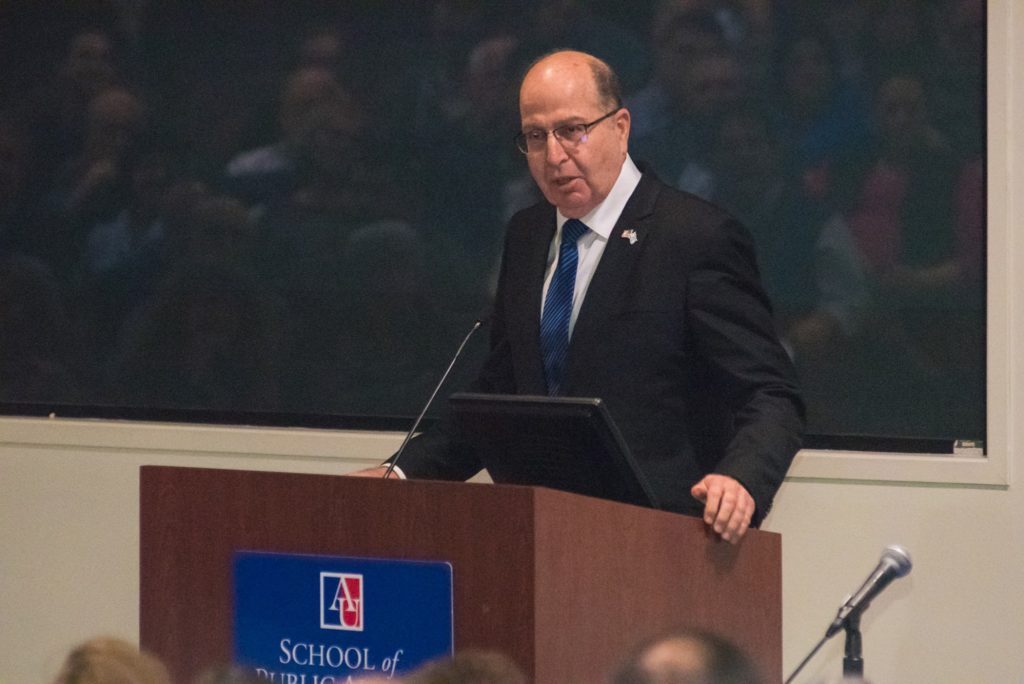
Former Israeli defense minister, General Moshe Ya’alon announced his candidacy for Prime Minister and gave his first public remarks, on Middle East politics, as a candidate in Washington on March 6th. He began by agreeing with the notion that the Middle East is in its biggest crisis since the time of Mohammad.
Ya’alon, a conservative, outlined his view of the developments that shape the Middle East today. The collapse of the artificial nation-state system is accelerated by the disengagement of the United States from the region. Turkey and Iran are filling that political vacuum. The two-state solution is mischaracterized, at best. And the perception that Israel sides with U.S. Republicans is likely to do more harm than good to Israel’s own interests.
Ya’alon detailed the creation of the modern Middle East as a Western intervention based on ignorance, wishful thinking, and paternalism. Western diplomats from Sykes-Picot to the CPA did not take into account the demography, geography, or history—tribes, sects, and ideologies—of the region when they drafted boundaries for new nations and established new governments. They believed naively that elections could develop profound understanding of and respect for human rights and democratic processes.
This faith leads to making decisions based on hope rather than on reality. Syrian or Iraqi national identities, for example, are subordinate to tribal, Kurdish, Alawite, Sunni, or Shia identities. Western interventionists believed that it was within their power, in their own interests, and in the interests of the peoples of the Middle East, to build and shape nations. Israel, too, he said, had made that mistake.
U.S. disengagement from the Middle East allows Iran, Turkey, and Russia to fill that power vacuum. Turkey allowed its borders to be porous enough for foreign fighters and materiel to flow to ISIS, and for Syrian refugees to flow to Europe. Russia swept into control of the situation in Syria when the U.S. hesitated over the chemical weapons “red line.”
But most importantly to Ya’alon, U.S. disengagement facilitated Iranian strengthening its roles in Iraq, Syria, Lebanon, and Yemen. In these capitals, and with Hamas, Iran advances its religious, political, and geostrategic interests.
On the Palestinian question, Ya’alon was more pragmatic than idealistic. He sees no chance for a final solution in the near future. Full separation would cause a security and humanitarian crisis. He wants more than the status quo – steady but incremental improvement, with increasing autonomy but not independence. This requires things like education reform and an end to terrorist financing, but is the best way forward for now, he judged.
Ya’alon noted that relations with the United States have developed at least two new problems. The general issue of partisanship, and Israel being seen as a “Republican not Democrat” issue, could have long-term negative consequences. Being identified with President Trump, if his popularity were to plunge, could bring U.S. support for Israel down with it. More broadly, Ya’alon worried about populism replacing real political leadership in many countries, with the manipulation of ideology for advantage instead of real statecraft and diplomacy.
Above all, though, Ya’alon returned to the idea that the real concern for Israel and the United States is Iran, Iran, Iran. The surging expansion of Iranian influence and the disengagement of the U.S. creates vital risks both to Israel and to American interests.
A version of this post first appeared on the Jerusalem Post web site.